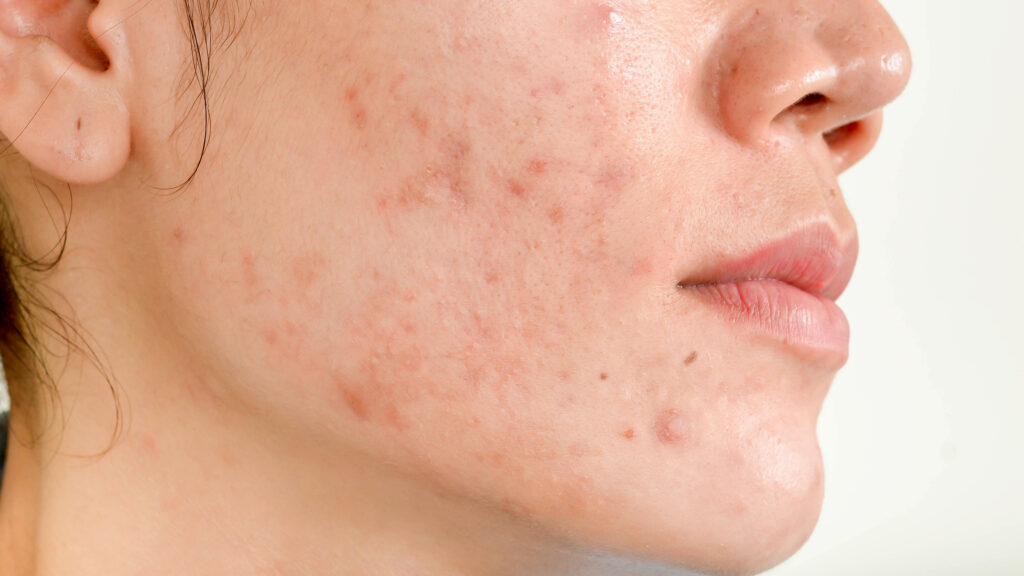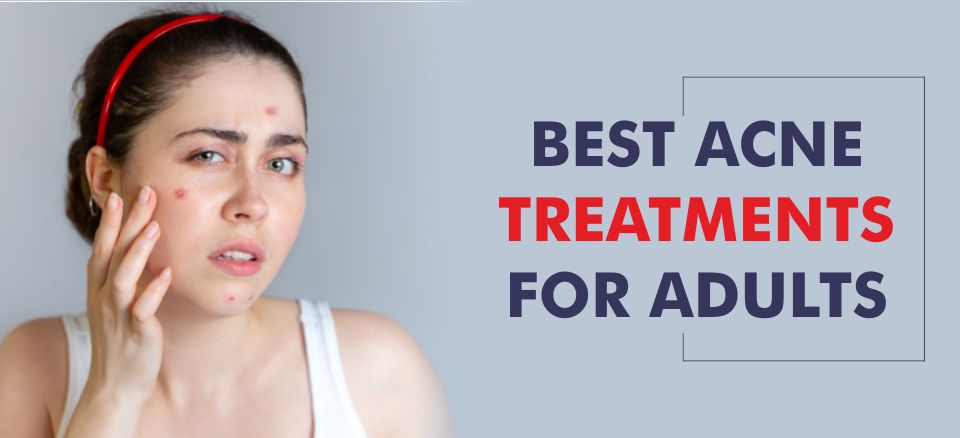Introduction
Acne is mainly a common skin problem that affects people of all ages. Dealing with acne can be frustrating, but with the right knowledge and products, you can effectively manage and reduce breakouts. Now, don’t worry we will explore you with valuable tips and recommend effective products to help you get rid of acne. From adopting a proper skincare routine to utilizing targeted treatments, we’ll cover various strategies to address this skin condition. Let’s discover the steps you can take to achieve clearer and healthier skin.
Understanding the Causes of Acne

Acne
- Excess Oil Production: One of the primary causes of acne is the overproduction of sebum (oil) by the skin’s sebaceous glands. Excess oil can clog the pores, leading to breakouts.
- Clogged Pores: When dead skin cells and oil accumulate in the pores, they can become clogged, trapping bacteria and causing inflammation.
- Bacterial Buildup: The presence of bacteria, specifically Propionibacterium acnes, can contribute to the development of acne. These bacteria thrive in the clogged pores and trigger an inflammatory response.
- Hormonal Factors: Hormonal fluctuations, such as during puberty, menstrual cycles, or hormonal imbalances, can increase oil production and lead to acne breakouts.
- Inflammation: Inflammatory factors, including cytokines and enzymes, play a role in the formation of acne lesions. Inflammation can make acne appear red, swollen, and painful.
- Genetic Predisposition: Some individuals may be genetically prone to developing acne. If your parents or close relatives have a history of acne, you may be more susceptible to experiencing breakouts.
Understanding these underlying causes of acne can help in implementing effective strategies for prevention and treatment. It’s important to address these factors holistically for better management of acne-prone skin.
Adopting a Proper Skincare Routine
Establishing a consistent skincare routine is key to managing acne. Here are essential steps to incorporate into your daily regimen:
- Cleansing: Use a gentle cleanser twice a day to remove dirt, oil, and impurities without stripping the skin of its natural moisture.
- Exfoliation: Regular exfoliation helps unclog pores and remove dead skin cells. Choose a gentle exfoliant suitable for your skin type to prevent irritation.
- Moisturizing: Moisturizing is important in a skincare routine for acne removal. It also enhance the skin beauty. It helps balance moisture levels, prevent dryness, and soothe irritation caused by acne treatments. Look for non-comedogenic formulas with acne-fighting ingredients to hydrate the skin without clogging pores. Even oily skin needs hydration to maintain a healthy barrier.
- Sun Protection: Sunscreen protects the skin from harmful UV rays that can worsen acne and cause post-inflammatory hyperpigmentation. Look for oil-free, non-comedogenic formulas to avoid clogging pores, and apply it daily as the last step in your routine. Sunscreen prevents dark spots and post-inflammatory hyperpigmentation caused by acne.
Acne Removal Products for Different Skin Types:
For Oily Skin:
. Salicylic Acid Cleanser: Helps to unclog pores and reduce excess oil production.
. Oil-Free Mattifying Moisturizer: Controls shine without clogging pores.
. Benzoyl Peroxide Spot Treatment: Targets and eliminates acne-causing bacteria.
For Dry Skin:
. Gentle Cleansing Lotion: Effectively cleanses without stripping the skin of moisture.
. Hyaluronic Acid Serum: Provides hydration without heaviness or greasiness.
. Non-Comedogenic Moisturizer: Locks in moisture without clogging pores.
For Combination Skin:
. Gel-Based Cleanser: Balances oil production without over-drying.
. Niacinamide Serum: Controls oil, minimizes pores, and reduces redness.
. Lightweight Moisturizer: Hydrates the skin without leaving a heavy or greasy feel.
For Sensitive Skin:
. Fragrance-Free Cleansing Balm: Gently removes impurities without causing irritation.
. Calming and Soothing Toner: Helps to reduce redness and inflammation.
. Aloe Vera Gel: Provides gentle hydration and soothes sensitive skin.
For Acne-Prone and Sensitive Skin:
. Tea Tree Oil Cleanser: Fights acne-causing bacteria while being gentle on the skin.
. Azelaic Acid Serum: Reduces inflammation and prevents clogged pores.
. Lightweight, Oil-Free Moisturizer: Hydrates without triggering breakouts.
Remember to patch test any new product and introduce them gradually into your skincare routine. What works for one person may not work for another, so it’s important to find products that suit your specific skin type and concerns.
Targeted Treatments for Acne
In addition to a proper skincare routine, targeted treatments can effectively address acne. Consider incorporating the following products into your routine:
- Benzoyl Peroxide: This ingredient helps kill acne-causing bacteria and reduces inflammation. Start with a lower concentration (2.5% or 5%) and gradually increase if needed.
- Salicylic Acid: Salicylic acid exfoliates the skin, unclogs pores, and reduces inflammation. It’s effective for treating blackheads and whiteheads.
- Retinoids: Retinoids, such as retinol or prescription-strength retinoids, help regulate cell turnover, prevent clogged pores, and reduce acne scarring.
- Tea Tree Oil: Known for its antibacterial and anti-inflammatory properties, tea tree oil can help calm redness and reduce acne lesions.
Professional Treatments for Acne
For severe or persistent acne, seeking professional help from a dermatologist is recommended. They may suggest the following treatments:
- Prescription Medications: Dermatologists can prescribe oral antibiotics, hormonal medications, or isotretinoin (Accutane) for severe cases of acne.
- Chemical Peels: Chemical peels exfoliate the skin and help improve acne, reduce scarring, and promote a smoother complexion.
- Laser or Light Therapies: These treatments target acne-causing bacteria and reduce inflammation. They can also help with acne scarring and hyperpigmentation.
Lifestyle Changes for Acne Prevention
In addition to skincare and treatments, adopting certain lifestyle changes can help prevent acne breakouts:
- Maintain a Healthy Diet: Limit your intake of sugary and processed foods. Instead, opt for a diet rich in fruits, vegetables, whole grains, and lean proteins.
- Manage Stress: High-stress levels can contribute to hormonal imbalances and trigger acne. Incorporate stress-management techniques like exercise, meditation, or engaging in hobbies.
- Avoid Touching Your Face: Avoid Touching your face repeatedly because it can transfer dirt, bacteria, and oils to your skin, leading to breakouts. Avoid picking or popping pimples to prevent scarring and further infection.
Conclusion
Dealing with acne requires a holistic approach, combining proper skincare, targeted treatments, professional interventions if necessary, and lifestyle adjustments. By understanding the causes of acne and implementing effective tips and products, you can effectively manage and reduce breakouts. If you’re unsure or have severe acne, consult a dermatologist who can provide personalized guidance and treatment options. With patience and a comprehensive approach, you can achieve clearer, healthier skin and regain your confidence.


